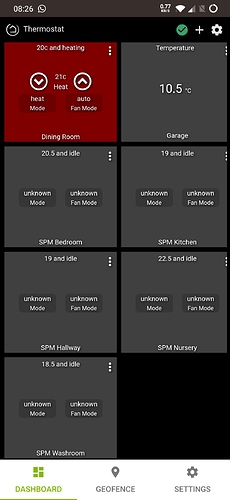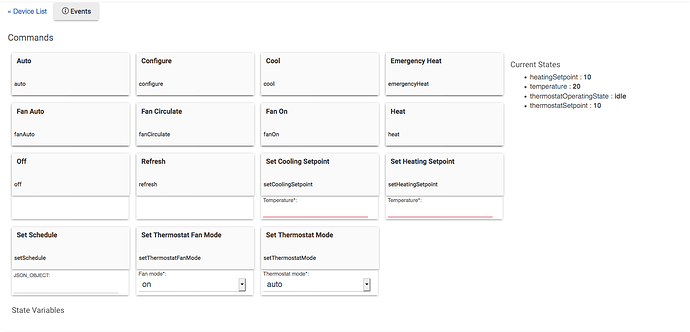Alright, so I took a swing at translating Stelpro's SmartThings driver for their Maestro thermostat.. It's basically a simplified version of the Ki driver.
Here is a pre-release version of the Hubitat driver. I've haven't tested it, so let me know if it works, or if any errors pops up in the Hubitat's log.
Note: That thermostat has an humidity sensor, which I haven't coded yet. Let's start with that temperature thing first!
/**
* Copyright 2020 Philippe Charette
* Copyright 2018 Stelpro
*
* Licensed under the Apache License, Version 2.0 (the "License"); you may not use this file except
* in compliance with the License. You may obtain a copy of the License at:
*
* http://www.apache.org/licenses/LICENSE-2.0
*
* Unless required by applicable law or agreed to in writing, software distributed under the License is distributed
* on an "AS IS" BASIS, WITHOUT WARRANTIES OR CONDITIONS OF ANY KIND, either express or implied. See the License
* for the specific language governing permissions and limitations under the License.
*
* Stelpro Ki ZigBee Thermostat Hubitat Driver
*
* Notice: This file is a modified version of the SmartThings Device Hander, found in this repository:
* https://github.com/stelpro/maestro-thermostat
*
* Author: Philippe Charette
* Author: Stelpro
*
* Date: 2020-01-22
*/
metadata {
definition (name: "Stelpro Maestro ZigBee Thermostat", namespace: "PhilC", author: "PhilC") {
capability "Configuration"
capability "TemperatureMeasurement"
capability "Thermostat"
capability "ThermostatHeatingSetpoint"
capability "ThermostatCoolingSetpoint"
capability "ThermostatSetpoint"
capability "Refresh"
fingerprint profileId: "0104", endpointId: "19", inClusters: " 0000,0003,0201,0204,0405", outClusters: "0402"
}
preferences {
input("lock", "enum", title: "Do you want to lock your thermostat's physical keypad?", options: ["No", "Yes"], defaultValue: "No", required: false, displayDuringSetup: false)
input name: "logEnable", type: "bool", title: "Enable debug logging", defaultValue: true
}
}
def parse(String description) {
logDebug "Parse description $description"
def descMap = zigbee.parseDescriptionAsMap(description)
logDebug "Desc Map: $descMap"
def map = [:]
if (description?.startsWith("read attr -")) {
if (descMap.cluster == "0201" && descMap.attrId == "0000")
{
map.name = "temperature"
map.value = getTemperature(descMap.value)
if (descMap.value == "7FFD") { //0x7FFD
map.value = "low"
}
else if (descMap.value == "7FFF") { //0x7FFF
map.value = "high"
}
else if (descMap.value == "8000") { //0x8000
map.value = "--"
}
else if (descMap.value > "8000") {
map.value = -(Math.round(2*(655.36 - map.value))/2)
}
sendEvent(name:"temperature", value:map.value)
}
else if (descMap.cluster == "0201" && descMap.attrId == "0012") {
logDebug "HEATING SETPOINT"
map.name = "heatingSetpoint"
map.value = getTemperature(descMap.value)
if (descMap.value == "8000") { //0x8000
map.value = getTemperature("01F4") // 5 Celsius (minimum setpoint)
}
sendEvent(name:"heatingSetpoint", value:map.value)
sendEvent(name:"thermostatSetpoint", value:map.value)
}
/* else if (descMap.cluster == "0201" && descMap.attrId == "001C") {
logDebug "MODE"
if (descMap.value != "04") {
map.name = "thermostatMode"
map.value = getModeMap()[descMap.value]
sendEvent(name:"thermostatMode", value:map.value)
}
else {
logDebug "descMap.value == \"04\". Ignore and wait for SETPOINT MODE"
}
}
else if (descMap.cluster == "0201" && descMap.attrId == "401C") {
logDebug "SETPOINT MODE"
logDebug "descMap.value $descMap.value"
if (descMap.value != "00") {
map.name = "thermostatMode"
map.value = getModeMap()[descMap.value]
sendEvent(name:"thermostatMode", value:map.value)
}
else {
logDebug "descMap.value == \"00\". Ignore and wait for MODE"
}
}*/
else if (descMap.cluster == "0201" && descMap.attrId == "0008") {
logDebug "HEAT DEMAND"
map.name = "thermostatOperatingState"
map.value = getModeMap()[descMap.value]
if (descMap.value < "10") {
map.value = "idle"
}
else {
map.value = "heating"
}
sendEvent(name:"thermostatOperatingState", value:map.value)
}
}
def result = null
if (map) {
result = createEvent(map)
}
logDebug "Parse returned $map"
return result
}
def logsOff(){
log.warn "debug logging disabled..."
device.updateSetting("logEnable",[value:"false",type:"bool"])
}
def refresh() {
logDebug "refresh"
def cmds = []
cmds += zigbee.readAttribute(0x201, 0x0000) //Read Local Temperature
cmds += zigbee.readAttribute(0x201, 0x0008) //Read PI Heating State
cmds += zigbee.readAttribute(0x201, 0x0012) //Read Heat Setpoint
//cmds += zigbee.readAttribute(0x201, 0x001C) //Read System Mode
//cmds += zigbee.readAttribute(0x201, 0x401C, [mfgCode: "0x1185"]) //Read System Mode
cmds += zigbee.readAttribute(0x204, 0x0000) //Read Temperature Display Mode
cmds += zigbee.readAttribute(0x204, 0x0001) //Read Keypad Lockout
return cmds
}
def logDebug(value){
if (logEnable) log.debug(value)
}
def configure(){
log.warn "configure..."
runIn(1800,logsOff)
logDebug "binding to Thermostat cluster"
// Set unused default values (for Google Home Integration)
sendEvent(name: "coolingSetpoint", value:getTemperature("0BB8")) // 0x0BB8 = 30 Celsius
sendEvent(name: "thermostatFanMode", value:"auto")
updateDataValue("lastRunningMode", "heat") // heat is the only compatible mode for this device
def cmds = [
//bindings
"zdo bind 0x${device.deviceNetworkId} 1 0x019 0x201 {${device.zigbeeId}} {}", "delay 200"
]
//reporting
cmds += zigbee.configureReporting(0x201, 0x0000, 0x29, 10, 60, 50) //Attribute ID 0x0000 = local temperature, Data Type: S16BIT
cmds += zigbee.configureReporting(0x201, 0x0008, 0x20, 10, 900, 5) //Attribute ID 0x0008 = pi heating demand, Data Type: U8BIT
cmds += zigbee.configureReporting(0x201, 0x0012, 0x29, 1, 0, 50) //Attribute ID 0x0012 = occupied heat setpoint, Data Type: S16BIT
//cmds += zigbee.configureReporting(0x201, 0x001C, 0x30, 1, 0, 1) //Attribute ID 0x001C = system mode, Data Type: 8 bits enum
//cmds += zigbee.configureReporting(0x201, 0x401C, 0x30, 1, 0, 1, [mfgCode: "0x1185"]) //Attribute ID 0x401C = manufacturer specific setpoint mode, Data Type: 8 bits enum
cmds += zigbee.configureReporting(0x204, 0x0000, 0x30, 1, 0) //Attribute ID 0x0000 = temperature display mode, Data Type: 8 bits enum
cmds += zigbee.configureReporting(0x204, 0x0001, 0x30, 1, 0) //Attribute ID 0x0001 = keypad lockout, Data Type: 8 bits enum
return cmds + refresh()
}
def getModeMap() { [
"00":"off",
"04":"heat",
"05":"eco"
]}
def getTemperature(value) {
if (value != null) {
logDebug("getTemperature: value $value")
def celsius = Integer.parseInt(value, 16) / 100
if (getTemperatureScale() == "C") {
return celsius
}
else {
return Math.round(celsiusToFahrenheit(celsius))
}
}
}
def getTemperatureScale() {
return "${location.temperatureScale}"
}
def off() {
logDebug "off"
zigbee.writeAttribute(0x201, 0x001C, 0x30, 0)
}
def heat() {
logDebug "heat"
def cmds = []
cmds += zigbee.writeAttribute(0x201, 0x001C, 0x30, 04, [:], 1000) // MODE
//cmds += zigbee.writeAttribute(0x201, 0x401C, 0x30, 04, [mfgCode: "0x1185"]) // SETPOINT MODE
return cmds
}
/*def eco() {
logDebug "eco"
def cmds = []
cmds += zigbee.writeAttribute(0x201, 0x001C, 0x30, 04, [:], 1000) // MODE
cmds += zigbee.writeAttribute(0x201, 0x401C, 0x30, 05, [mfgCode: "0x1185"]) // SETPOINT MODE
return cmds
}*/
def cool() {
log.info "cool mode is not available for this device. => Defaulting to off instead."
off()
}
def auto() {
log.info "auto mode is not available for this device. => Defaulting to heat mode instead."
heat()
}
def emergencyHeat() {
log.info "emergencyHeat mode is not available for this device. => Defaulting to heat mode instead."
heat()
}
def fanAuto() {
log.info "fanAuto mode is not available for this device"
}
def fanCirculate(){
log.info "fanCirculate mode is not available for this device"
}
def fanOn(){
log.info "fanOn mode is not available for this device"
}
def setSchedule(JSON_OBJECT){
log.info "setSchedule is not available for this device"
}
def setThermostatFanMode(fanmode){
log.info "setThermostatFanMode is not available for this device"
}
def setHeatingSetpoint(preciseDegrees) {
if (preciseDegrees != null) {
def temperatureScale = getTemperatureScale()
def degrees = new BigDecimal(preciseDegrees).setScale(1, BigDecimal.ROUND_HALF_UP)
logDebug "setHeatingSetpoint(${degrees} ${temperatureScale})"
def celsius = (temperatureScale == "C") ? degrees as Float : (fahrenheitToCelsius(degrees) as Float).round(2)
int celsius100 = Math.round(celsius * 100)
zigbee.writeAttribute(0x201, 0x0012, 0x29, celsius100) //Write Heat Setpoint
}
}
def setCoolingSetpoint(degrees) {
log.info "setCoolingSetpoint is not available for this device"
}
def setThermostatMode(String value) {
logDebug "setThermostatMode({$value})"
def currentMode = device.currentState("thermostatMode")?.value
def lastTriedMode = state.lastTriedMode ?: currentMode ?: "heat"
def modeNumber;
Integer setpointModeNumber;
def modeToSendInString;
switch (value) {
case "heat":
case "emergency heat":
case "auto":
return heat()
case "cool":
default:
return off()
}
}
def updated() {
parameterSetting()
}
def parameterSetting() {
def lockmode = null
def valid_lock = 0
log.info "lock : $settings.lock"
if (settings.lock == "Yes") {
lockmode = 0x01
valid_lock = 1
}
else if (settings.lock == "No") {
lockmode = 0x00
valid_lock = 1
}
if (valid_lock == 1)
{
log.info "lock valid"
def cmds = []
cmds+= zigbee.writeAttribute(0x204, 0x01, 0x30, lockmode) //Write Lock Mode
cmds+= refresh()
return cmds
}
else {
log.info "nothing valid"
}
}


